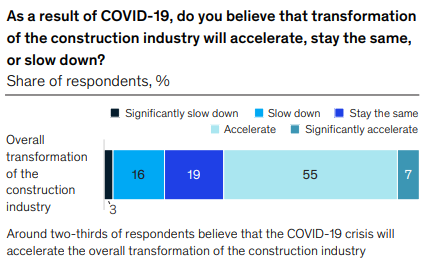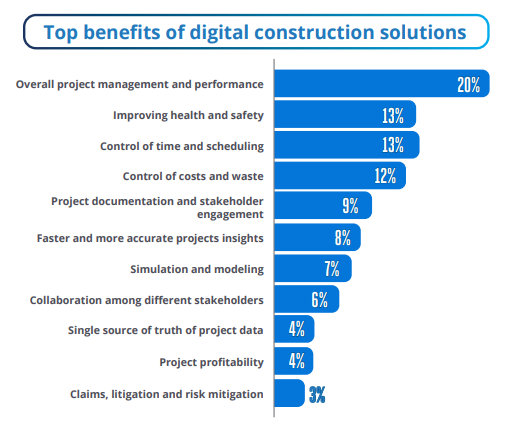Request for more details
The construction industry, known for its robust presence in the global economy, has not been immune to the transformative power of the digital age. In an era where technology reigns supreme, even traditionally non-digital sectors like construction are leveraging the advantages of the digital realm. One of the key facets of this transformation is digital marketing. In this blog post, we'll explore the profound impact of digital marketing on construction businesses and your success in the industry.
Introduction
The construction industry has historically relied on word-of-mouth referrals and traditional advertising methods. However, the advent of digital marketing has paved the way for innovative approaches to reach a broader audience. With the right strategies, construction companies can establish a strong online presence, thereby expanding their reach.
The Digital Revolution in Construction
The construction industry, historically rooted in tradition, is now embracing the winds of change brought by the digital revolution. Gone are the days when construction relied solely on manual labor and physical blueprints. Today, technology-driven innovations are redefining every aspect of the construction process, from design and planning to execution and marketing.Advanced software tools, drones, augmented reality (AR), and virtual reality (VR) have become essential tools for architects, engineers, and construction managers. These technologies not only improve accuracy and efficiency but also enhance safety and collaboration on construction sites. For instance, AR can help visualize finished projects, while VR can provide immersive walkthroughs, reducing errors and minimizing project delays.
The integration of digital tools is not limited to the operational side of construction; it extends to the way construction businesses interact with clients and stakeholders. This is where digital marketing takes center stage.
The Impact of Digital Marketing
Digital marketing is the bridge connecting construction businesses with their audience in the modern landscape. It's more than just having a website or a social media presence; it's about utilizing these tools strategically to build a brand, attract potential clients, and thrive in a highly competitive industry.
Digital marketing empowers construction companies to tell their unique story and showcase their expertise. It allows them to reach clients where they spend a significant part of their time – online. By harnessing digital marketing strategies, construction businesses can set themselves apart in a crowded marketplace.
According to a survey by ConstructConnect, 89% of construction companies believe that digital marketing has had a positive impact on their businesses. By leveraging the power of digital marketing, construction businesses can not only remain relevant but also scale and prosper in the digital age.
Challenges Faced by Construction Businesses
However, despite its vast economic footprint, the construction industry is rife with challenges. Tight profit margins, labor shortages, project delays, and ever-evolving regulations pose substantial hurdles. In such a competitive and dynamic landscape, construction businesses must adapt to survive and thrive. This is where Digital Marketing can help construction businesses transform their strategies and approaches to compete in today’s digital space.
Digital Transformation in Construction Industry
Digital Transformation in Construction refers to the adoption of digital technologies to enhance the efficiency of operations within the construction sector. These technologies encompass a wide range of tools, from physical devices used in the field to software applications utilized in the office.
In times of crisis, leaders who proactively adapt to the changing landscape tend to outperform those who are slower to respond. Companies that not only focus on surviving but also take swift and decisive strategic actions typically come out as the victors.
Throughout previous economic downturns, the organizations that succeeded were the ones that acted promptly to enhance their productivity. They recognized the need to make strategic moves that not only ensured their survival but also positioned them for long-term success. In essence, preparing for a fundamentally different 'next normal' requires businesses to be agile, forward-thinking, and willing to take bold steps to thrive in an evolving landscape.
The construction industry, characterized by its diversity, includes global corporations, national firms, and smaller players. While the nature of projects, industries served, and working conditions may differ, there is a common issue of low planning efficiency and productivity. Projects often exceed their scheduled timelines and budgets.
To put this in perspective, over the last two decades, global construction productivity growth has averaged just 1%, as reported by McKinsey. In contrast, the manufacturing sector has seen productivity growth of 3.6%. The construction industry has historically lagged in adopting technology, ranking only ahead of agriculture and hunting in technology adoption.
Amidst rising operational costs and global uncertainties, construction companies are increasingly recognizing the importance of digitization. The construction industry, much like healthcare, automotive, and retail, stands to gain significant advantages from embracing digital transformation. This surge in demand for change in construction practices is driven by the need to boost efficiency, reduce costs, and ensure the successful completion of projects within the stipulated timeframes and budgets.
Benefits of Digital Marketing for Construction Businesses
In today's digital age, having a robust online presence is crucial for any business, including construction companies. Prospective clients often turn to the internet to research, find, and evaluate construction services. This makes it imperative for construction businesses to maintain a professional and informative website that showcases their expertise, portfolio, and contact information.
Construction firms across the globe identify certain key advantages and areas where digital construction solutions, such as Building Information Modeling (BIM) workflows, bid management, project management, and insights, can have a positive impact on their construction projects. These solutions offer improved project planning, organization, and decision-making, ultimately leading to better project outcomes and overall project management.
Here are the key benefits of digital transformation for businesses:
Improved Visibility and Brand Awareness In the digital age, visibility and brand awareness are key to success. With the right digital marketing services, construction companies can significantly enhance their online presence. Through social media, content marketing, and SEO services, businesses can create a brand that stands out in a crowded marketplace.
- Increased Productivity : Digital transformation often leads to increased productivity through automation and streamlining of processes. Construction companies can benefit from tools and software that facilitate project management, resource allocation, and communication, ultimately saving time and resources.
- Targeted Marketing for Niche Audiences : Digital marketing enables construction businesses to target specific audiences. Whether you're aiming at residential or commercial construction, green building, or a specialized niche, digital marketing allows you to tailor your messaging and reach the right people at the right time.
- Data-Driven Decision Making : One of the most significant advantages of digital marketing is the wealth of data it provides. From website analytics to social media insights, construction companies can make data-driven decisions to refine their strategies, allocate resources effectively, and maximize ROI.
- Improved Worker Collaboration : Digital solutions enable enhanced collaboration among workers, both on-site and remotely. Through digital communication tools, project updates, and shared platforms, construction teams can work more efficiently and collaboratively, leading to better project outcomes.
- Better Risk Management : Digital tools can assist in identifying and managing risks more effectively. Advanced analytics and data-driven insights can provide a comprehensive view of potential risks, allowing construction companies to proactively address issues and reduce the likelihood of costly setbacks.
- Cost-Effective Advertising : Compared to traditional advertising methods, digital marketing is often more cost-effective. Pay-per-click advertising, for instance, allows construction companies to set budgets, target specific keywords, and pay only when someone clicks on their ad. This level of control makes every marketing dollar count.
- Sales Workflows : Digital transformation can optimize sales workflows, allowing construction companies to manage client relationships, inquiries, and proposals more efficiently. With Customer Relationship Management (CRM) software and digital communication, the sales process becomes smoother and more organized.
- Measuring ROI in Real : Time In the digital world, measuring the return on investment (ROI) is almost instantaneous. Construction businesses can track the performance of their online campaigns, allowing for real-time adjustments and optimization to maximize results.
Latest SEO Tools We Use














Digital Marketing in Construction Industry
Digital marketing, in the context of the construction industry, refers to a set of strategies and techniques aimed at promoting and growing construction businesses through online channels. It encompasses a wide array of tools and practices that leverage the digital landscape to connect with potential clients, improve brand visibility, and ultimately drive business growth.
Digital marketing includes a range of strategies and platforms, such as:
- Website Optimization : Building and maintaining a user-friendly website that showcases your portfolio, highlights your expertise, and offers easy ways for potential clients to contact you is a cornerstone of digital marketing for construction. Optimizing your website for search engines (SEO) ensures that it ranks well in search results, increasing your chances of being found by those in need of your services.
- Content Marketing : Create high-quality, informative content that educates your audience. This might include blog posts on construction trends, case studies of your past projects, or informative videos. Content writing services not only showcases your expertise but also helps with SEO and keeps your audience engaged.
- Social Media Engagement : Maintain an active presence on social media platforms that are relevant to your target audience. Share updates about your ongoing projects, behind-the-scenes glimpses of your work, and industry insights. Social media marketing helps you connect with potential clients, build your brand, and foster trust in your expertise.
- Email Marketing : Building and nurturing an email list can be a valuable asset. Email marketing can include newsletters, project updates, promotional emails, and informative articles. Consistent, relevant email communication keeps you on your audience's radar, making them more likely to consider your services for their next construction project.
- Paid Advertising (PPC) : Paid advertising can generate immediate visibility for your construction business. Through platforms like Google Ads and social media ads, you can target specific keywords or demographics, ensuring your message reaches the right audience. Paid advertising allows for precise budget management and detailed performance tracking.
By implementing these digital marketing strategies effectively, construction companies can position themselves for success in the online marketplace. The combination of a well-optimized website, engaging content, active social media presence, email marketing, and targeted advertising helps construction businesses connect with their audience, stand out in a competitive industry, and drive growth. Digital marketing is not just a trend but a fundamental part of modern business strategy for construction professionals looking to expand their reach and thrive in the digital age.
In particular, real estate businesses under the construction umbrella can greatly benefit from SEO. Real estate SEO focuses on optimizing your online presence to attract more potential buyers and renters through search engines. By using targeted real estate keywords and real estate SEO strategies, real estate companies can ensure their listings and services appear at the top of search results. This not only drives more qualified traffic to their websites but also enhances credibility and trust with potential clients.
Challenges and Pitfalls in Digital Marketing for Construction
Digital marketing can be very effective for the construction industry, but it also comes with some unique challenges and pitfalls. Avoiding common mistakes and being aware of these challenges is key to having an effective digital marketing strategy.
Some common mistakes in construction digital marketing include:
- Not having a mobile-friendly website - With so many people accessing the web via smartphones, a mobile-friendly site is essential. Sites that are not optimized for mobile devices will have high bounce rates and poor visibility.
- Generic content - Content should be tailored specifically for the construction industry with relevant keywords and topics. Avoid generic blog posts and social media content.
- Not monitoring online reviews - Online reviews can make or break a construction business's reputation. Firms need to actively monitor and respond appropriately to reviews on sites like Google, Facebook, and Yelp.
- Not integrating digital with traditional marketing - Digital and traditional efforts like print ads and billboards should work together in a cohesive marketing mix.
- Poor website user experience - If a site is difficult to navigate, confusing, or has broken links, users will quickly click away. User experience should be optimized.
Some key challenges in construction digital marketing include:
- Fragmented customer base - Construction firms often serve multiple customer groups like homeowners, B2B clients, subcontractors etc. Digital marketing campaigns may need to target each.
- Seasonal fluctuations - Construction activity peaks and dips at different times of the year. Marketing campaigns need to adjust.
- Safety focus - Safety is paramount in construction. Marketing should align with and not compromise the firm's safety culture.
- Conservative industry - The construction sector can be slow to adopt new innovations like digital marketing. Firms may need to educate their customers.
- Local focus - Most construction businesses operate in a limited geographic area which requires a localized or hyperlocal approach for digital marketing to be effective.
To overcome these kinds of challenges, construction companies should stay up-to-date on digital marketing best practices, invest in marketing expertise, use data to guide efforts, and implement robust analytics. A thoughtful and strategic approach to digital marketing will help construction firms maximize success and avoid pitfalls.

Free SEO Analysis
Future Trends in Construction Marketing
The future of digital marketing in the construction industry holds exciting possibilities. We explore emerging technologies such as virtual reality (VR), augmented reality (AR), and artificial intelligence (AI) and how they are likely to impact the industry.
What Lies Ahead for Digital Marketing in Construction
Digital marketing for the construction industry is still evolving and new trends continue to emerge. Construction companies who want to stay competitive and reach their target audiences need to pay attention to these trends and be ready to adapt their strategies.
Some key trends to look out for in the future of digital marketing for construction include:
- Drone footage & virtual/augmented reality - Drones and VR will allow potential clients to "tour" construction projects remotely. This tech will be a powerful sales and marketing tool.
- Live video - As data speeds improve, live streaming video on social media will provide engaging behind-the-scenes looks at construction projects in action.
- Artificial intelligence - AI will help gather customer data, predict trends, recommend content topics, and optimize marketing campaigns.
- Chatbots - Chatbots on websites can provide 24/7 customer service and quickly answer common questions.
- Hyper-targeted ads - Location-based mobile ads will reach consumers when they are near construction sites or businesses.
- Reviews integrated into the buying process - Reviews may be built into contractor/subcontractor bidding platforms to better inform hiring decisions.
- Partnerships with influencers - Partnering with influencers in construction can help firms reach new audiences on social media.
- Focus on customer retention - More emphasis will be placed on retaining existing customers through digital loyalty and referral programs.
Construction companies that stay on the cutting edge of these marketing trends will have a competitive advantage as they build their brands and connect with customers in new ways. Digital marketing will only grow in importance in the years ahead.
Conclusion
The construction industry faces unique challenges when it comes to digital marketing, but the potential rewards make it worth the effort. By having a strong online presence, utilizing the right social media platforms, focusing on SEO, generating leads through pay-per-click ads, and exploring emerging technologies, construction companies can set themselves apart from the competition.
Digital marketing has emerged as a transformative force for construction businesses, offering new ways to reach and engage clients, streamline operations, and boost brand visibility. By embracing digital marketing strategies, construction companies can position themselves for success in an increasingly competitive industry. As the digital ecosystem continues to evolve, staying informed and adaptable is essential for reaping the full benefits of these powerful tools.
To maximize success, firms need to commit to digital marketing and integrate it into their overall business strategy. Companies that embrace digital transformation will improve their profitability and gain a competitive edge. With the right digital marketing plan in place, construction businesses can build their brands, engage their audience, stay at the forefront of their industry, and position themselves for long-term growth and success.















